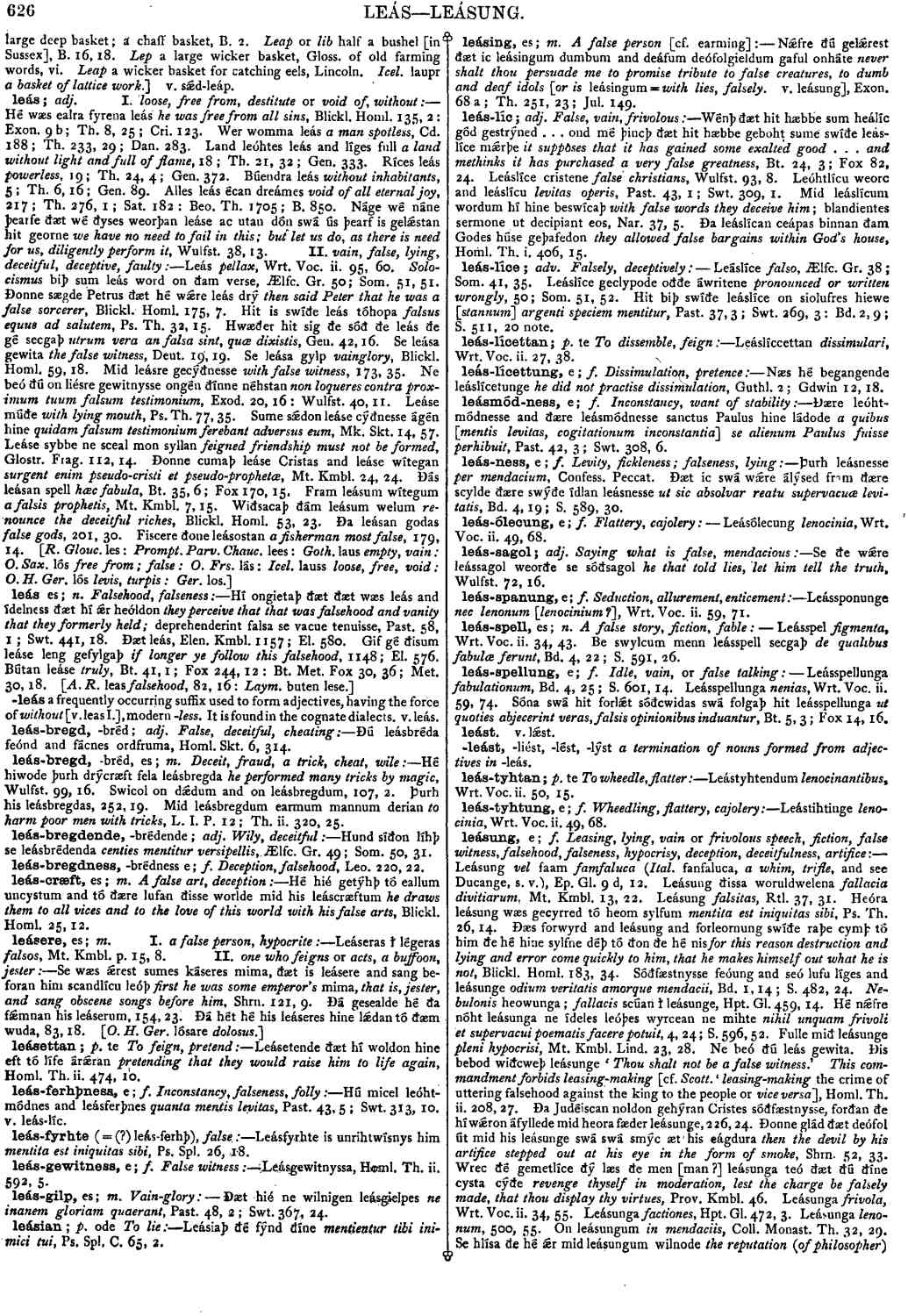leásung
- noun [ feminine ]
-
Leásung vel faam famfaluca
(Ital. fanfaluca, a whim, trifle, and see Ducange, s. v.),
- Ep. Gl. 9 d, 12 .
-
Leásung ðissa woruldwelena
fallacia divitiarum,
- Mt. Kmbl. 13, 22.
-
Leásung
falsitas,
- Rtl. 37, 31 .
-
Heóra leásung wæs gecyrred tó heom sylfum
mentita est iniquitas sibi,
- Ps. Th. 26, 14 .
-
Ðæs forwyrd and leásung and forleornung swíðe raþe cymþ tó him ðe hé hine sylfne déþ tó ðon ðe hé nis
for this reason destruction and lying and error come quickly to him, that he makes himself out what he is not,
- Blickl. Homl. 183, 34 .
-
Sóðfæstnysse feóung and seó lufu líges and leásunge
odium veritatis amorque mendacii,
- Bd. 1, 14 ;
- S. 482, 24.
-
Nebulonis
heowunga;
fallacis
scúan ł leásunge,
- Hpt. Gl. 459, 14 .
-
Hé nǽfre nóht leásunga ne ídeles leóþes wyrcean ne mihte
nihil unquam frivoli et supervacui poematis facere potuit,
- 4, 24 ;
- S. 596, 52 .
-
Fulle mið leásunge
pleni hypocrisi,
- Mt. Kmbl. Lind. 23, 28 .
-
Ne beó ðú leás gewita. Ðis bebod wiðcweþ leásunge
'Thou shall not be a false witness.' This commandment forbids leasing-making [cf. Scott. 'leasing-making the crime of uttering falsehood against the king to the people or vice versa ],
- Homl. Th. ii. 208, 27 .
-
Ða Judéiscan noldon gehýran Cristes sóðfæstnysse, forðan ðe hí wǽron áfyllede mid heora fæder leásunge,
- 226, 24 .
-
Ðonne glád ðæt deófol út mid his leásunge swá swá smýc æt his eágdura
then the devil by his artifice stepped out at his eye in the form of smoke,
- Shrn. 52, 33 .
-
Wrec ðé gemetlíce ðy læs ðe men [man?] leásunga teó ðæt ðú ðíne cysts cýðe
revenge thyself in moderation, lest the charge be falsely made, that thou display thy virtues,
- Prov. Kmbl. 46 .
-
Leásunga
frivola,
- Wrt. Voc. ii. 34, 55 .
-
Leásunga
factiones,
- Hpt. Gl. 472, 3 .
-
Leásunga
lenonum,
- 500, 55 .
-
On leásungum
in mendaciis,
- Coll. Monast. Th. 32, 29 .
-
Se hlísa ðe hé ǽr mid leásungum wilnode
the reputation (of philosopher) that he had before desired under false pretences,
- Bt. 18, 4 ;
- Fox 68, 5 .
-
Nelle wé eác mid leásungum þyllíc líccetan,
- Homl. Skt. pref. 49 .
-
Leásingum beswicen ðæt hé wéneþ furþon ðæt hé man ne sý
[so] deceived by false notions that he thinks even that he is not man,
- Blickl. Homl. 179, 5 :
- Elen. Kmbl. 2243 ;
- El. 1123.
-
For ðínum leásungum
on account of thy falsehoods,
- Cd. 214 ;
- Th. 268, 28 ;
- Sat. 62 .
-
Ðú fordést ða ðe symle leásinga specaþ
thou shalt destroy them that speak leasing
- [A.V.], Ps. Th. 5, 5.
-
Onscúna ðú á leásunga,
- L. Ælf. 44 ;
- Th. i. 54, 14 :
- Homl. Th. ii. 482, 25 .
-
Fácen and leásunga from úrum heortum ádoon
to remove deceit and falseness from our hearts,
- Blickl. Homl. 95, 27 .
-
Þurh áðbrycas and þurh weddbrycas and þurh mistlíce leásunga,
- Swt. A. S. Rdr. l09, 151 .
-
Búton ðú forlǽte ða leásinga, weohweorðinga,
- Exon. 68 a ;
- Th. 253, 13 ;
- Jul. 179 :
- Elen. Kmbl. 1375 ;
- El. 689 .
-
Ðyllíce leásunga hí worhton and míhton eáþe secgan sóþsped gif him ða leásunga nǽron swétran,
- Bt. 35, 4 ;
- Fox 162, 14 :
- 38, 1 ;
- Fox 196, 8 .
Bosworth, Joseph. “leásung.” In An Anglo-Saxon Dictionary Online, edited by Thomas Northcote Toller, Christ Sean, and Ondřej Tichy. Prague: Faculty of Arts, Charles University, 2014. https://bosworthtoller.com/21310.
Checked: 1